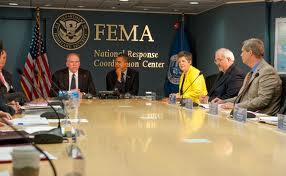It’s a chilly afternoon at Oak Mountain State Park, but the cold isn’t keeping the kids inside. To watch them ride their bikes and play tag, you’d have no idea what these kids have been through. Until you look up to where they live. This is Camper Park B, home to FEMA trailers that house more than 100 evacuees from Hurricane Katrina. The campers are small, and the children who live here spill out onto the dirt paths that make up their makeshift neighborhood. Parents, like Douglas Rhodes and Kristy – she doesn’t want to use her last name – watch on. They say the adjustment to life in Alabama has been tough.
(Rhodes) “Yeah, all the little kids, like instead of being at home where you have a set schedule and structure and everything, but now you’re living in a state park, in a camper, you can’t stay inside all the time because the campers are so small and the kids are just going to go stir-crazy so they go out and play all day and they think it’s a vacation.”
(Kristy) “Evan, being four, he work up the other morning crying. He wanted to go home, I mean we left his parakeet back and his rabbit back. He wanted to go home and get his things. First, you cry. And then you just try to make the best out of it. You know, I tell him that’s god’s taking care of his animals… and it’s hard.”
All children cope with trauma differently, but the federal Substance Abuse and Mental Health Services Administration says young kids like Evan can often regress – asking to be fed or dressed and wetting their beds. Older school-aged kids may cope with anxiety and fear by “acting out”… abandoning regular chores and school work, competing for attention or becoming withdrawn.
After a disaster, school is often a welcomed diversion. More than reading, math and recess – it’s a source of stability… and emotional anchor. The parents and grandparents at Oak Mountain say the Shelby County School system has been welcoming to their kids…. maybe too welcoming, says one grandmother. Katherine Manasses says the students and teachers at her 11 year-old granddaughter Brittany’s school have tried so hard to be sensitive to what are, no doubt, painful memories for Brittany – that no one has asked her what she went through back in St. Bernard Parrish or how she’s feeling about it today. That’s exactly what young hurricane victims needs, says Red Cross volunteer Lisa Taylor – a chance to sort through the devastation of the last few months and make sense of it all.
“I do think that it is a major adjustment for the school children in terms of your peer and your social support… your social network when you’re in school are all your friends and these kids have been uprooted in that way too.”
(Kristy) “I know some of the kids have made fun of the children because they live in campers.
Kristy – we heard from her earlier – has two kids in addition to four-year-old Evan. Her oldest is having a particularly hard time.
“We’ve went through that ordeal where they’ve been made fun of. Some kids handle it differently. Like my fourteen year old and Mason, which is a little boy here, when he’s told ‘you live in a camper, you don’t have a house’, cruel things like that, you know, when you’re going to school and you know, we lost everything, you know… Mason doesn’t do well with people making fund of him, telling him he’s homeless.”
“The National Alliance on Mental Illness cautions that often time parents miss the signs that a child needs help. Getting new jobs, new homes and new lives settled can be all-consuming, particularly when parents are dealing with their own trauma, as Kristy is. When her four-year-old Evan had a cold a month or so back, she tracked down her old family doctor from New Orleans for a phone consult. He reassured her that Evan would be fine and comforted her. Just recently, though, she found out that the man who’d been her family’s doctor for 20 years had hung himself.
“I was in the store with my mom and my girlfriend called me and she says Kristy, you’re never going to believe this, Dr. Trebway hung his self. He couldn’t handle it. He couldn’t handle the pressure of losing all his patients and nobody was coming back. I’m in Hobby Lobby and I’m crying my eyes out!”
Kristy wipes her eyes, steels herself and looks back to her son Evan, who’s busy rough housing with the little boys in the park. For now, Kristy and other parents like her will have to continue leaning on the schools and other support groups for their children. The state’s mental health office is working with UAB to put together special programming to reach out to evacuees enrolled in Alabama’s public schools. Their success will depend in part on whether they get the grants necessary to fund the outreach.

